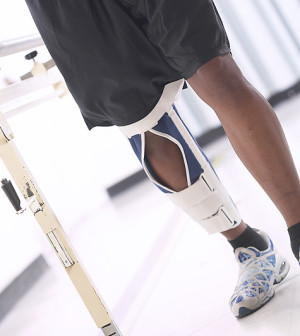- Could Your Grocery Store Meat Be Causing Recurring UTIs?
- Are You Making This Expensive Thermostat Error This Winter?
- Recognizing the Signs of Hypothyroidism
- 10 Strategies to Overcome Insomnia
- Could Artificial Sweeteners Be Aging the Brain Faster?
- Techniques for Soothing Your Nervous System
- Does the Water in Your House Smell Funny? Here’s Why
- Can a Daily Dose of Apple Cider Vinegar Actually Aid Weight Loss?
- 6 Health Beverages That Can Actually Spike Your Blood Sugar
- Treatment Options for Social Anxiety Disorder
Knee Cartilage Product Approved to Repair Defects

Maci (autologous cultured chondrocytes) has been approved by the U.S. Food and Drug Administration to repair defective cartilage of the knee.
The treatment, derived from healthy cartilage from the patient’s own knee, uses tissue engineering to grow cells that replace the damaged cartilage, the agency said in a news release.
Cartilage defects commonly stem from an injury, knee strain, overuse, muscle weakness or general wear-and-tear, the FDA said.
The new process uses the patient’s own (autologous) cells, which are placed on a collagen membrane scaffolding that is surgically implanted over the area where damaged cartilage was removed. The membrane is designed to be absorbed by the body over time.
The surgeon installing the implants should be trained in the Maci product. Multiple implants can be used if there is more than one defect, the FDA said.
Maci’s safety and effectiveness were demonstrated during a two-year, 144-patient clinical study that compared the new product to an alternate surgical procedure. Potential side effects of Maci included joint pain, cold-like symptoms, headache and back pain.
Maci is produced by Vericel Corp., based in Cambridge, Mass.
More information
Visit the FDA to learn more.
Source: HealthDay
Copyright © 2026 HealthDay. All rights reserved.










